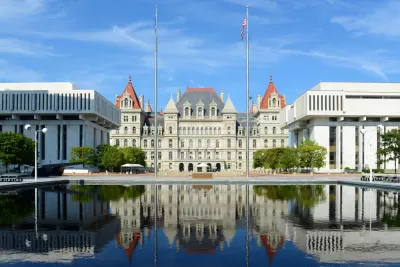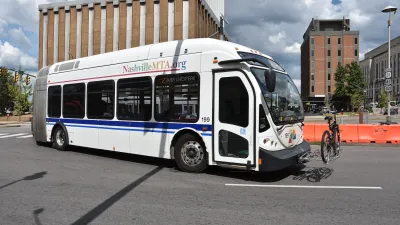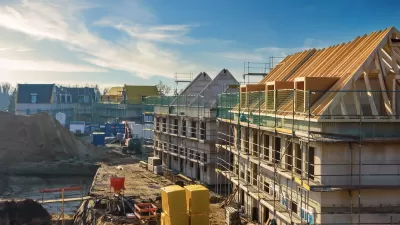State governments like to limit local taxing authority but not local zoning—maybe they should do the exact opposite.

When I was listening to a speech about street design, I heard repeated references to the state government—about what "Albany" (the state of New York) will allow New York City to do and what it won't allow the city to do. This incident made me wonder: Where should we draw the lines between state and local authority?
The dominant American view seems to be that the local governments have almost-total control over zoning, but very little control over anything else. In particular, statewide politicians like to gain political support by claiming credit for cutting local property taxes, or by preventing local governments from instituting new taxes.
It seems to me, however, that this distribution of state and local responsibilities is absolutely backwards. Why? I begin with two assumptions:
- Normally, a city’s residents and politicians know how to run their own affairs to a greater extent than do nonresident politicians (such as state legislators from other cities or from rural areas).
- An exception to this principle exists when a) a city’s actions significantly harm nearby towns (e.g. by allowing pollution that crosses municipal boundaries) or (b) there is a "tragedy of the commons" problem (where a certain policy is good for each individual municipality, and thus widely adopted, but is harmful to the region as a whole).
So how do these assumptions apply to specific policies? First, it seems to me that local governments should have nearly absolute power to set their own tax rates and decide their own mix of rates, with no state interference. For example, there is no reason why the governor of New Jersey should have more power over Piscataway's tax rates than the voters of Piscataway. The governor might have visited Piscataway once or twice while running for office, but otherwise has no special expertise in local affairs. Similarly, nearby towns are not harmed if Piscataway's tax rates are too high: if anything, they benefit if Piscataway overtaxes itself, as people and businesses move to those towns. Similarly, there is no "tragedy of the commons" issue: it is not particularly rational for an individual town or suburb to overtax itself. Ideally, state constitutions would give local governments plenary power over taxes (with the possible exception of taxes that affect nonresidents, such as hotel taxes).
On the other hand, the case for local control of zoning is much weaker. The "local expertise" argument (assumption 1 above) may still apply to zoning. However, restrictive zoning clearly creates a "tragedy of the commons" problem. It is rational for each city's homeowners to have highly restrictive zoning, to limit the housing supply and thus increase property prices. In cities with rent control, it is also rational for renters to prefer restrictive zoning, since they are unlikely to move and thus do not benefit from new construction.* For the same reasons, it is rational for neighborhoods within a city to prefer restrictive zoning.
However, restrictive zoning is irrational for a city or region as a whole: it leads to stunted housing supply, thus increasing housing prices, thus keeping out poor and middle-class workers and new residents generally. In fact, recent economic scholarship suggests that zoning even harms the national economy. Because restrictive zoning is rational for each city or neighborhood but irrational for the region as a whole, state governments should rigorously police local zoning.
In sum, state governments are active where they should be passive, and passive where they should be active.
*Indeed, it could be argued that even ordinary renters benefit from restrictive zoning in certain circumstances: where new housing is more attractive than the existing housing stock, thus making the neighborhood more attractive and raising rents for everyone. This claim too involves a tragedy of the commons: it is more likely that new housing will make one neighborhood especially attractive if it is confined to that area, while new housing in every neighborhood is not likely to make one area attractive relative to others, which in turn means that new housing is more likely to bring down rents everywhere.

Alabama: Trump Terminates Settlements for Black Communities Harmed By Raw Sewage
Trump deemed the landmark civil rights agreement “illegal DEI and environmental justice policy.”

Planetizen Federal Action Tracker
A weekly monitor of how Trump’s orders and actions are impacting planners and planning in America.

The 120 Year Old Tiny Home Villages That Sheltered San Francisco’s Earthquake Refugees
More than a century ago, San Francisco mobilized to house thousands of residents displaced by the 1906 earthquake. Could their strategy offer a model for the present?

In Both Crashes and Crime, Public Transportation is Far Safer than Driving
Contrary to popular assumptions, public transportation has far lower crash and crime rates than automobile travel. For safer communities, improve and encourage transit travel.

Report: Zoning Reforms Should Complement Nashville’s Ambitious Transit Plan
Without reform, restrictive zoning codes will limit the impact of the city’s planned transit expansion and could exclude some of the residents who depend on transit the most.

Judge Orders Release of Frozen IRA, IIJA Funding
The decision is a victory for environmental groups who charged that freezing funds for critical infrastructure and disaster response programs caused “real and irreparable harm” to communities.
Urban Design for Planners 1: Software Tools
This six-course series explores essential urban design concepts using open source software and equips planners with the tools they need to participate fully in the urban design process.
Planning for Universal Design
Learn the tools for implementing Universal Design in planning regulations.
Clanton & Associates, Inc.
Jessamine County Fiscal Court
Institute for Housing and Urban Development Studies (IHS)
City of Grandview
Harvard GSD Executive Education
Toledo-Lucas County Plan Commissions
Salt Lake City
NYU Wagner Graduate School of Public Service






























